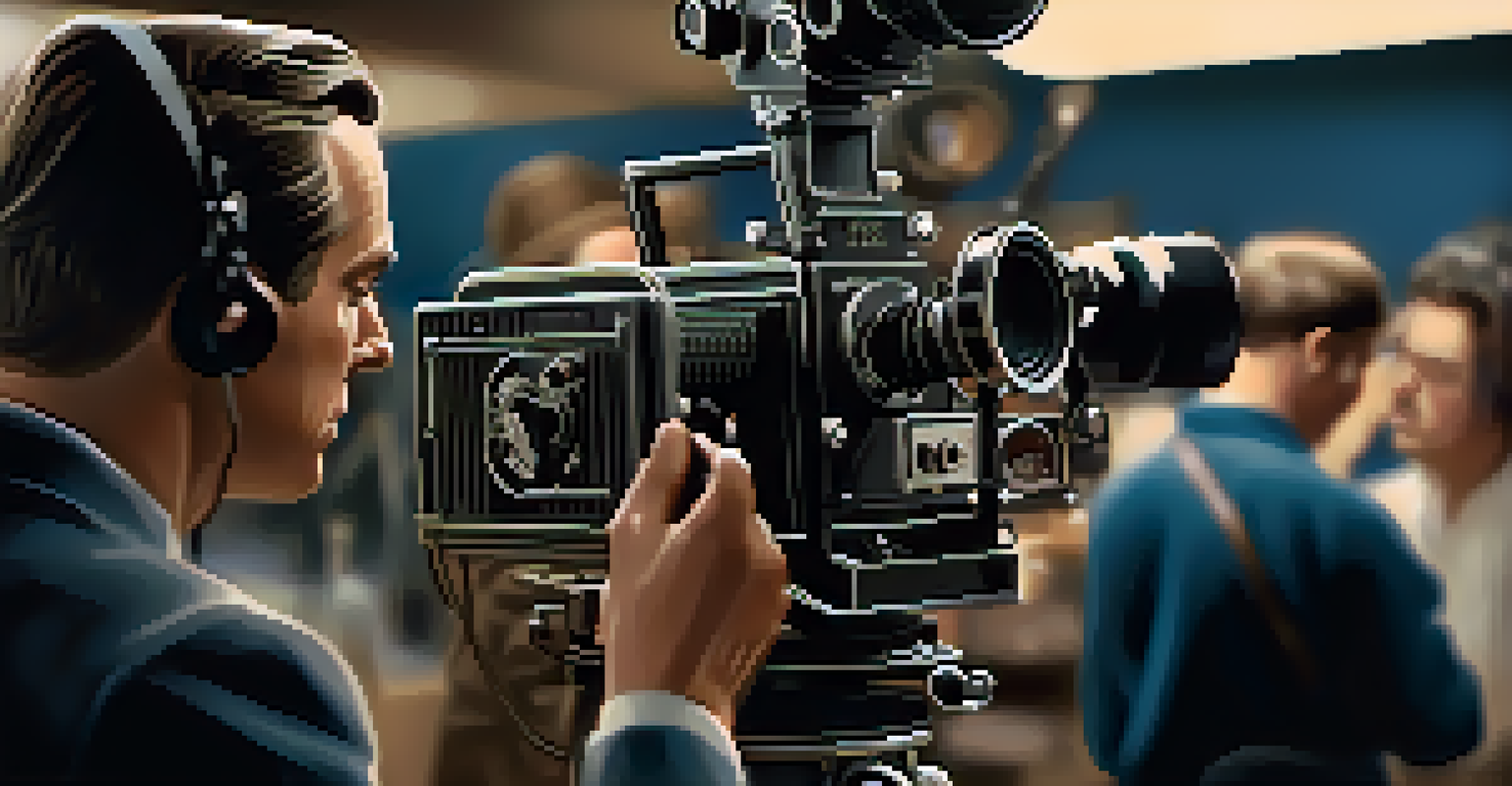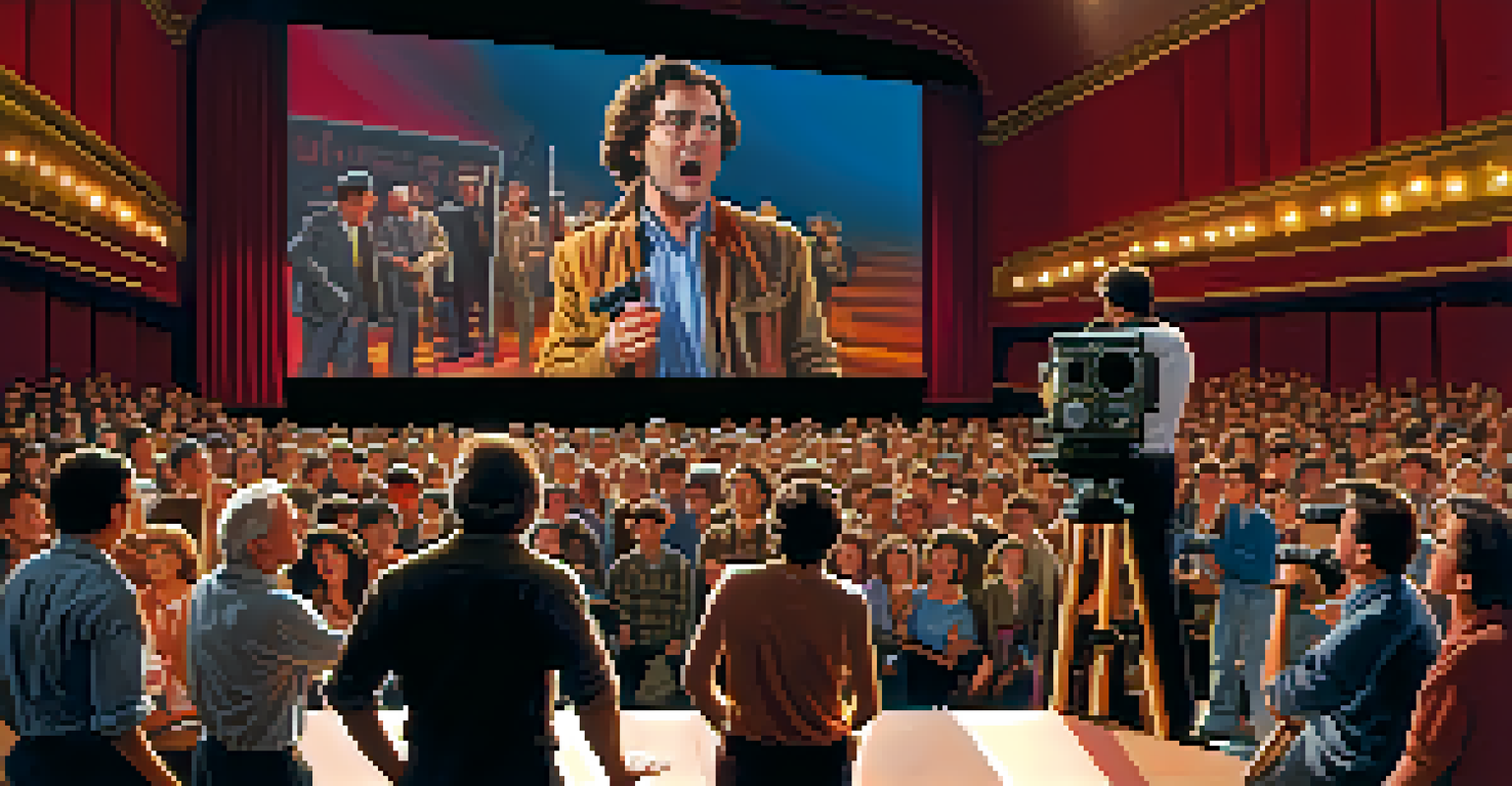The Legacy of Classic Hollywood Directors: Visionaries of Film

Defining the Golden Age of Hollywood Directors
The Golden Age of Hollywood, spanning from the 1920s to the 1960s, was marked by an extraordinary group of directors who shaped the film industry. These visionaries, such as Alfred Hitchcock and Frank Capra, not only created iconic films but also developed unique storytelling techniques that became staples in cinema. Their ability to blend narrative with innovative visuals set a standard that filmmakers still aspire to today.
Film is a truth 24 times a second.
During this period, directors began to gain more creative control, influencing everything from script development to casting decisions. This shift allowed them to imprint their distinct styles on their films, leading to a diverse range of genres and themes. The legacy of this era is evident in how contemporary directors approach their craft, often paying homage to the techniques pioneered by their predecessors.
Moreover, the cultural impact of these directors extended beyond just entertainment. They tackled social issues, reflected societal values, and often pushed the boundaries of what was acceptable in film, paving the way for future generations of storytellers.
The Artistic Vision of Alfred Hitchcock
Alfred Hitchcock, known as the 'Master of Suspense,' revolutionized the thriller genre with his innovative storytelling and psychological depth. His films, such as 'Psycho' and 'Rear Window,' are celebrated for their intricate plots and masterful use of tension. Hitchcock's unique ability to manipulate audience emotions through visual storytelling remains an influential aspect of filmmaking today.

One of Hitchcock's trademarks was his use of the 'MacGuffin,' a plot device that drives the narrative but is often of little importance to the overall story. This technique encourages viewers to focus on character development and suspense rather than the specifics of the object itself. By doing so, Hitchcock taught filmmakers the power of audience engagement, a lesson still relevant in modern cinema.
Influential Directors Shaped Cinema
Directors like Hitchcock and Capra pioneered innovative storytelling techniques that continue to influence modern filmmakers.
Additionally, his pioneering work in editing and camera techniques, such as the famous 'dolly zoom' in 'Vertigo,' changed how stories could be visually told. By experimenting with angles and perspectives, he opened up new avenues for filmmakers to explore, allowing for greater creativity in visual storytelling.
The Social Commentary of Frank Capra's Films
Frank Capra is best known for his films that celebrated the American spirit and often highlighted social issues. Movies like 'It’s a Wonderful Life' and 'Mr. Smith Goes to Washington' reflect his belief in the goodness of people and the importance of community. Capra's work resonated during the Great Depression, providing hope and a sense of belonging to audiences in difficult times.
The camera is an instrument that teaches people how to see without a camera.
His storytelling approach often combined humor with poignant social commentary, making his films both entertaining and thought-provoking. This blend of light-heartedness and seriousness allowed viewers to reflect on important issues while still enjoying the narrative. Capra's films serve as a reminder of the power of cinema to inspire change and evoke emotion.
Moreover, Capra's emphasis on strong, relatable characters made his films timeless. By focusing on the struggles and triumphs of ordinary people, he created a connection with audiences that transcends generations, reminding us that the human experience is at the heart of every great story.
Innovations by Orson Welles in Storytelling
Orson Welles, a true innovator in filmmaking, made waves with his groundbreaking debut, 'Citizen Kane.' Often hailed as one of the greatest films of all time, it introduced techniques such as deep focus and non-linear storytelling that challenged traditional cinematic norms. Welles' approach to narrative structure opened doors for filmmakers to experiment with time and perspective.
Beyond technical innovation, Welles' ability to weave complex themes into his films set him apart as a visionary. 'Citizen Kane' delves into the complexities of power, loss, and identity, illustrating how personal experiences shape one's legacy. This deep psychological exploration paved the way for more character-driven narratives in cinema.
Social Issues Reflected in Film
Many classic Hollywood films tackled social issues and reflected societal values, demonstrating cinema's power to inspire change.
Welles' work reminds us that film can be both an art form and a medium for profound commentary. His influence is evident in the works of countless directors who have followed, eager to replicate his boldness in storytelling and visual experimentation.
The Visual Aesthetics of Federico Fellini
Federico Fellini is renowned for his distinct visual style and imaginative storytelling that defies conventional narrative structures. Films like 'La Dolce Vita' and '8½' blend fantasy and reality, creating a dream-like quality that captivates audiences. Fellini's work is marked by vibrant imagery, elaborate set designs, and a unique use of symbolism, making his films visually arresting.
His ability to fuse personal experiences with broader social themes created a rich tapestry of storytelling that resonates with viewers. By reflecting his own life and the complexities of human emotions, Fellini's films invite audiences into his world, encouraging introspection and connection. This personal touch adds depth to the visual experience, making his work unforgettable.
Fellini's legacy extends beyond his films; he influenced generations of filmmakers to embrace the artistic aspects of cinema. His emphasis on visual storytelling and the exploration of the human condition encourages filmmakers to dig deeper into their own narratives, showcasing the importance of artistry in film.
The Enduring Influence of John Ford
John Ford is celebrated for his powerful storytelling and mastery of the Western genre. Films like 'The Searchers' and 'Stagecoach' not only defined Westerns but also showcased complex characters and moral dilemmas. Ford's work reflects the American landscape and spirit, capturing both the beauty and brutality of the frontier experience.
His innovative use of landscape as a character in its own right added depth to his narratives. By framing his stories against the backdrop of vast deserts and mountains, Ford emphasized the relationship between characters and their environment. This technique inspired filmmakers to consider how setting can enhance storytelling.
Legacy of Diverse Voices in Film
Women directors such as Dorothy Arzner and Ida Lupino broke barriers, enriching the film industry with diverse perspectives.
Moreover, Ford's films often explore themes of loyalty, sacrifice, and the search for identity. His ability to weave these themes into compelling narratives resonates with audiences, illustrating the timelessness of his work and the lessons it imparts about the human experience.
The Impact of Women Directors in Classic Hollywood
While classic Hollywood is often dominated by male directors, women like Dorothy Arzner and Ida Lupino made significant contributions to the film industry. Arzner was a trailblazer, being one of the first female directors to gain recognition, and her films often explored themes of female empowerment. Her work laid the groundwork for future generations of women filmmakers.
Ida Lupino, known for her gritty and realistic portrayals of women's experiences, broke barriers by directing and producing her own films. Her ability to tackle controversial subjects, such as social issues and female autonomy, set her apart in a male-dominated industry. Lupino's tenacity and vision continue to inspire women in film today.

The legacy of these women directors is a poignant reminder of the importance of diverse voices in storytelling. Their contributions not only enriched the cinematic landscape but also paved the way for a more inclusive and representative film industry, encouraging contemporary filmmakers to amplify underrepresented perspectives.
The Lasting Legacy of Classic Hollywood Directors
The legacy of classic Hollywood directors is a testament to the power of vision and creativity in film. Their innovative techniques, compelling storytelling, and deep character development have left an indelible mark on the industry. These directors not only entertained but also challenged societal norms and explored complex themes, influencing generations of filmmakers.
As we look at contemporary cinema, the echoes of their work can be seen in the films we watch today. From the suspenseful narratives of modern thrillers to the visual storytelling of art-house films, the principles established by these pioneers continue to guide and inspire. Their ability to connect with audiences on an emotional level remains a cornerstone of successful filmmaking.
In celebrating the contributions of classic Hollywood directors, we recognize the rich tapestry of storytelling that shapes our cultural landscape. Their influence endures, reminding us of the transformative power of cinema and its ability to reflect and challenge our understanding of the world.